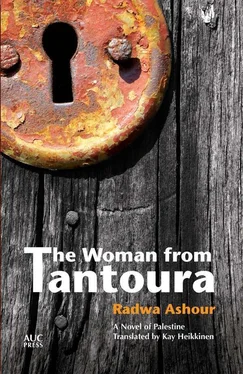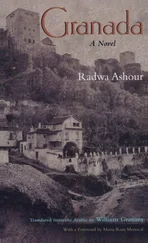He was standing in the station waiting to get on the train, returning to where he had come from, so how absurd it was to ask him to register his stop and to get an identity card for waiting. Ezz took his father’s papers and those of the family and registered the household on his own at the agency. Until his death, after twenty-seven years of residence in Sidon, my uncle did not know that he was registered as a refugee, and that Ezzedin would accept aid regularly, sometimes taking it to his mother and aunt or, usually, distributing it to the needy.
Perhaps the image of waiting at the station isn’t accurate: even though my uncle resisted the idea of accepting his position, absorbed as he was in limited operations across the newly established borders, nonetheless day after day he stood before an alternate reality, which he neither acknowledged nor recognized even as he crept into it by stealth. The camps were taking their current form, making their presence hard to ignore or deny. Some of his acquaintances would tell him about the restraints and pressures to which the camp residents were subjected by the Second Bureau and the Lebanese authorities. He would suddenly shout in a loud voice, “Good God, they need permission from the authorities to leave the camp? Is it a prison?” I was pregnant with my second son when the authorities carried out the forced evacuation of the refugees from the border villages, relocating them to the camps, as a decree had been issued forbidding Palestinians from living in the southern villages adjacent to their lands. My uncle had friends who lived in Bint Jbeil, like him living as guests with their business partners. In accordance with the decree they were forced to move to the Ain al-Helwa camp. I remember my uncle as he struck one hand with the other in despair. He was angry, but he was more troubled than angry, repeating that he did not understand. The Arab kings and presidents had no mercy and left no way open for God’s mercy! Why were they moving people far from their land, when, sooner or later, they would move back to it?
My uncle lived in anticipation, like my mother, but her anticipation was different. The concern about returning home hid behind her anticipation of the return of her sons and her husband. She kept saying, “The boys haven’t sent any news from Egypt, nor has Abu Sadiq sent a letter from prison.” Whenever she heard that a man from our village or from another had arrived in Sidon and had been among the prisoners, she would seek him out and go to visit him. She would congratulate him first, and then ask, “Did you meet Abu Sadiq?” She would return to the house to tell us what the freed prisoner had said, and every time she would repeat the same words: “It’s been a long time for Abu Sadiq. One of the spies must have told them that he was in the revolt in ’36 so that instead of one charge it was two, and they decided to imprison him longer than the others. How long it’s been!” One day my aunt tried gently to prepare the way for her sister to accept what happened. She said, “Zeinab, Sister, they say that some of the men died in prison, maybe Abu Sadiq was one of them.” My mother started as if she had been stung by a scorpion and exclaimed, “God forbid! I take refuge with God from you and your thoughts!” For the next three weeks in a row my mother’s face was pale, and it became paler if she was forced to speak with her sister or be present with her in the same room.
The wait was not long for my mother. She waited until I married Amin. She sang, she trilled for joy, she joined the women’s rhythmic clapping the day the contract was written and the day of the wedding, and on the morning of the following day she and my aunt visited me in my new house in Sidon. They came carrying the usual provisions for a newly married couple. One week later my aunt found her dead in her bed. My aunt said, “Last night she said to me ‘Halima, Sister, thank God I’ve married Ruqayya and she has moved safely and soundly to live in her husband’s house. Now it’s possible for me to travel to Egypt to look for Sadiq and Hasan.’ When I said to her that Egypt is large and that we don’t know where they are in it, she said, ‘Tell Abu Amin, and if he agrees we’ll go together, and if he doesn’t agree I’ll go alone. I won’t come back without them.’ Then she went to sleep.” My aunt wiped away her tears and got up. She went into my mother’s room and returned, extending her hand to me with a large iron key. She said, “The key to your house, Ruqayya.”
“Strange. I haven’t seen it since we left the house. Where was she hiding it?”
“She hung it around her neck. She didn’t take it off even when she slept or bathed. I would say to her, ‘Zeinab, Sister, the cord will wear out. Take it off when you bathe and then put it on again.’ She wouldn’t accept it. The cord came apart as I expected and she got a new cord to hang it on, and continued her habit of sleeping with it and bathing with it.”
I took the key. After the three days of mourning I returned to my house. I thought I would give the key to Amin to keep with the papers, his birth certificate, his diploma, and his work permit. I became aware that I had no papers other than the identity card issued by Lebanese security, and I changed my mind. I thought, I’ll return it to my uncle Abu Amin because it’s the key to his house also, since it’s the same house. He’ll put it in the deep pocket of his long-sleeved qumbaz and will finger it from time to time and feel … and feel what? I put it on the palm of my left hand and contemplated it. An old iron key, dark in color and polished. It filled the hand; it had heft. I felt it with the fingers of my right hand, acquainting myself with it by touch after getting to know it by sight. Suddenly I smiled and decided that I was stupid, looking far and wide when the clear and simple thing was right in front of my eyes. I grasped the thin cord with both of my hands, raised it, and put my head into it. The key was now hanging on my neck. I held it and began to look at it again, then I put it under my dress, feeling the touch of the iron on the flesh of my breast. As with my mother, the key would remain suspended on my neck, in waking and sleeping. I do not take it off, even in the bathroom, and whenever the cord wears out I replace it with a new one.
Years later when we moved to Beirut and I participated in the campaign for literacy among women in Shatila, and I had to visit the women of the camp to convince them of the importance of literacy, I discovered that what I had inherited from my mother was common. I found it strange — how could the women all do the same thing, without any prior agreement? I remember my first visit. Since it was my first time I was shy and confused, not knowing if the visit would seem intrusive or if it would be welcome. I was met by Umm Ibrahim, an elderly woman in her sixties who lived with her son, her daughter-in-law, and her grandchildren. She introduced herself to me, and I said that I was from Tantoura, and that I was the wife of Dr. Amin in the Palestinian Red Crescent. She said, “We’re from Saasaa, do you know it?” She spared my embarrassment by not waiting for me to answer. She continued, telling me about it and about the two massacres that occurred there. She said, “I lost a daughter in the first massacre, in February. She was five years old. We buried her there, in the village. In October, five months after the Jews had declared their state, they attacked us again. It was another massacre. They took over the village and threw us out.”
Umm Ibrahim put her hand to her breast and showed me the key suspended on a cord around her neck. She said, “The key to our house.”
Later on I would learn that most of the women of the camp carried the keys to their houses, just as my mother did. Some would show them to me as they told me about the villages they came from, and sometimes I would glimpse the end of the cord around their necks, even if I didn’t see the key. Sometimes I would not see it and the lady would not refer to it, but I would know that it was there, under her dress.
Читать дальше












